-
 bitcoin
bitcoin $87959.907984 USD
1.34% -
 ethereum
ethereum $2920.497338 USD
3.04% -
 tether
tether $0.999775 USD
0.00% -
 xrp
xrp $2.237324 USD
8.12% -
 bnb
bnb $860.243768 USD
0.90% -
 solana
solana $138.089498 USD
5.43% -
 usd-coin
usd-coin $0.999807 USD
0.01% -
 tron
tron $0.272801 USD
-1.53% -
 dogecoin
dogecoin $0.150904 USD
2.96% -
 cardano
cardano $0.421635 USD
1.97% -
 hyperliquid
hyperliquid $32.152445 USD
2.23% -
 bitcoin-cash
bitcoin-cash $533.301069 USD
-1.94% -
 chainlink
chainlink $12.953417 USD
2.68% -
 unus-sed-leo
unus-sed-leo $9.535951 USD
0.73% -
 zcash
zcash $521.483386 USD
-2.87%
What is a post-only order in futures?
A post-only order ensures your trade adds liquidity to the order book and avoids immediate execution, helping you qualify for maker rebates and avoid taker fees.
Jul 16, 2025 at 10:56 am
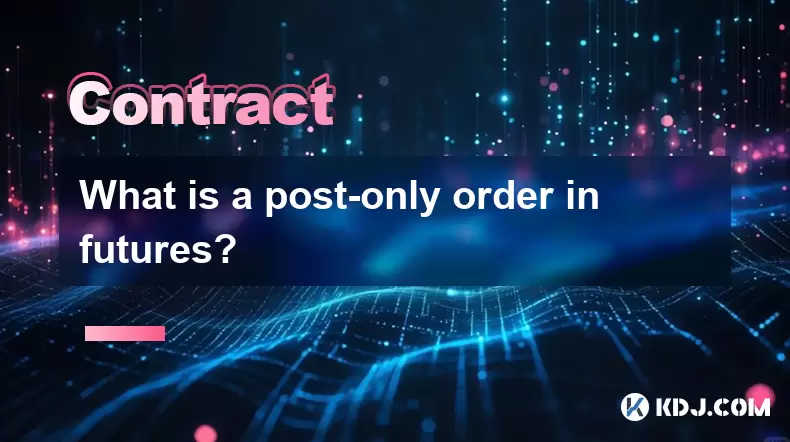
Understanding the Concept of a Post-Only Order
A post-only order is a specialized type of limit order used in cryptocurrency futures trading. This order ensures that the trade will only be executed if it does not immediately match with an existing order on the opposite side of the market. In other words, the post-only order must add liquidity to the order book, rather than remove it. If the order would otherwise result in an immediate execution (i.e., matching with a resting order), it gets canceled automatically.
This feature makes post-only orders particularly useful for traders who want to avoid paying taker fees and instead benefit from maker rebates offered by many exchanges. The essence of this order lies in its ability to maintain the trader's position on the order book without triggering instant trades.
How Does a Post-Only Order Work?
When placing a post-only order, the system checks whether the order can be placed on the order book without being filled immediately. If the bid price is higher than or equal to the best ask price (for buy orders), or the ask price is lower than or equal to the best bid price (for sell orders), the order will not be accepted and will be canceled.
For example:
- If you place a buy post-only order at $30,000 when the current best ask is $29,500, the order will execute immediately as a taker order — hence, it will be rejected.
- However, if you place a buy post-only order at $29,400 when the best ask is $29,500, it will be added to the order book as a maker order, waiting for a seller to match it later.
This mechanism enforces the rule that post-only orders cannot act as taker orders under any circumstances.
Why Use a Post-Only Order in Futures Trading?
Traders often use post-only orders to optimize their trading costs. Since these orders are classified as maker orders, they typically qualify for lower fees or even fee rebates depending on the exchange's fee structure.
Additionally:
- They help traders avoid slippage by ensuring that their orders don't get filled at less favorable prices due to aggressive market conditions.
- They allow traders to set up limit orders with confidence that those orders won’t accidentally execute immediately at undesirable levels.
- They are commonly used in algorithmic trading strategies where maintaining a presence in the order book is more important than immediate execution.
By using post-only orders, traders gain more control over execution quality and cost efficiency.
Differences Between Post-Only Orders and Other Order Types
It's essential to distinguish post-only orders from other common order types like market orders, standard limit orders, and immediate-or-cancel (IOC) orders.
- Market Orders: Execute instantly at the best available price but do not go into the order book. They always act as takers.
- Standard Limit Orders: Can either act as makers or takers depending on the market price. They may get filled immediately if placed at or better than the current market price.
- Immediate-or-Cancel (IOC): Executes immediately any portion that can be matched and cancels the rest. These also act as takers.
In contrast, a post-only order strictly functions as a maker and never executes immediately. If it would otherwise act as a taker, it gets canceled entirely.
Setting Up a Post-Only Order: A Step-by-Step Guide
Placing a post-only order varies slightly across platforms, but most major exchanges like Binance, Bybit, and OKX support this functionality. Below is a general guide applicable to most futures trading platforms:
- Navigate to the trading interface for the desired futures contract.
- Select 'Limit Order' as the order type.
- Look for the option labeled 'Post-Only,' usually found near advanced order settings.
- Enable the post-only checkbox or toggle switch.
- Enter your desired price and quantity for the order.
- Review the order details carefully to ensure it aligns with your strategy.
- Click 'Buy' or 'Sell' to submit the order to the exchange.
Some exchanges may display a warning if your price setting would trigger an immediate fill, prompting you to adjust the price before proceeding.
Common Scenarios Where Post-Only Orders Are Beneficial
There are several situations where using a post-only order becomes strategically advantageous:
- When trying to accumulate a large position gradually without moving the market price.
- In arbitrage setups where orders need to sit in the book until price discrepancies arise.
- During high volatility periods, where traders wish to avoid accidental fills at unfavorable prices.
- For users participating in maker rebate programs offered by exchanges to reduce overall trading costs.
These scenarios highlight how post-only orders offer precision and control, especially in fast-moving futures markets.
Frequently Asked Questions
Q1: Can I convert a regular limit order into a post-only order after submission?No, once a limit order has been submitted, it cannot be changed to a post-only order. You must cancel the existing order and resubmit it with the post-only option enabled.
Q2: Do all exchanges support post-only orders in futures trading?Most major cryptocurrency exchanges do support post-only orders for futures contracts. However, availability may vary depending on the specific platform and the trading pair or contract involved.
Q3: What happens if my post-only order partially matches with another order?A post-only order cannot be partially filled if doing so would result in a taker trade. The entire order must either be fully added to the order book or canceled if it would otherwise match immediately.
Q4: Is there a minimum time a post-only order must remain in the book before being canceled?Generally, no. As long as the post-only order does not match with existing orders upon submission, it will remain in the book indefinitely until filled or manually canceled by the user.
Disclaimer:info@kdj.com
The information provided is not trading advice. kdj.com does not assume any responsibility for any investments made based on the information provided in this article. Cryptocurrencies are highly volatile and it is highly recommended that you invest with caution after thorough research!
If you believe that the content used on this website infringes your copyright, please contact us immediately (info@kdj.com) and we will delete it promptly.
- Bitcoin Drops Amidst Analyst Warnings and Shifting Market Sentiment
- 2026-02-05 09:40:02
- Georgia Brothers Sentenced to 20 Years for Elaborate COAM Gambling Fraud Scheme
- 2026-02-05 09:45:01
- MicroStrategy Stock Loss: Pension Funds Face 60% Plunge Amidst Crypto Volatility
- 2026-02-05 10:55:01
- Super Bowl LX: Teddy Swims, Green Day, and a Legacy Toss Set for 2026 Extravaganza
- 2026-02-05 07:20:02
- Fantasy Football Premier League Round 25: Key Player Picks, Tips, and Advice for Optimal Team Performance
- 2026-02-05 07:15:02
- Remittix Launches PayFi Platform with a Generous 300% Bonus Offer, Driving Investor Excitement
- 2026-02-05 07:05:01
Related knowledge

How to Manage Emotions and "Revenge Trading" in Futures?
Feb 05,2026 at 12:19am
Understanding Emotional Triggers in Futures Markets1. Market volatility directly impacts psychological states, often amplifying fear or euphoria based...

How to Analyze Market Sentiment Using the Fear and Greed Index?
Feb 05,2026 at 07:40am
Understanding the Fear and Greed Index1. The Fear and Greed Index is a composite metric designed to quantify prevailing emotional states among cryptoc...
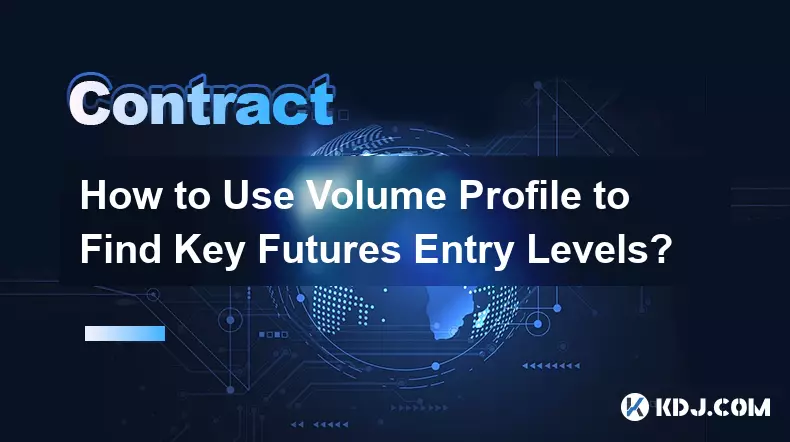
How to Use Volume Profile to Find Key Futures Entry Levels?
Feb 04,2026 at 11:39pm
Understanding Volume Profile Structure1. Volume Profile displays the distribution of traded volume at specific price levels over a defined time period...
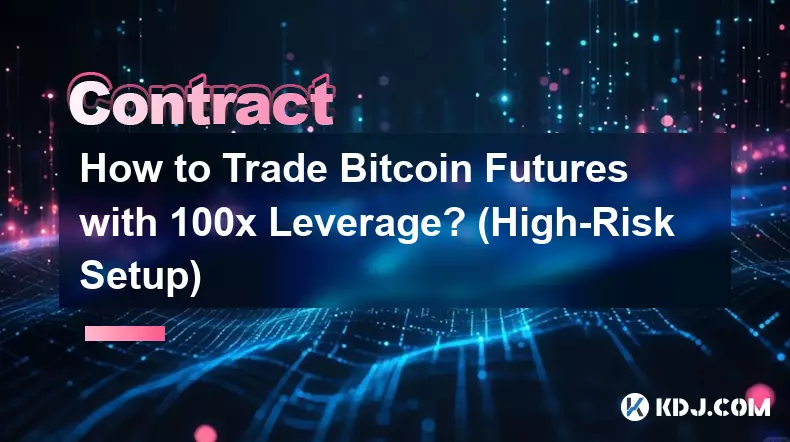
How to Trade Bitcoin Futures with 100x Leverage? (High-Risk Setup)
Feb 05,2026 at 11:00am
Understanding Bitcoin Futures Mechanics1. Bitcoin futures contracts represent agreements to buy or sell BTC at a predetermined price and date in the f...
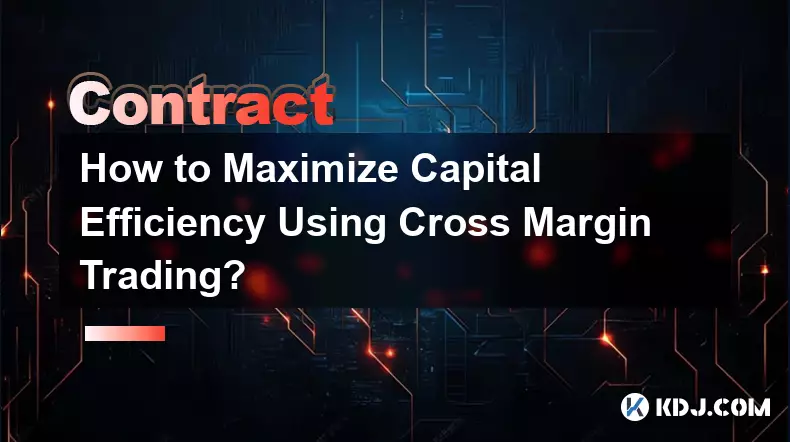
How to Maximize Capital Efficiency Using Cross Margin Trading?
Feb 05,2026 at 12:40am
Cross Margin Trading Fundamentals1. Cross margin trading allows traders to use their entire account balance as collateral for open positions across mu...
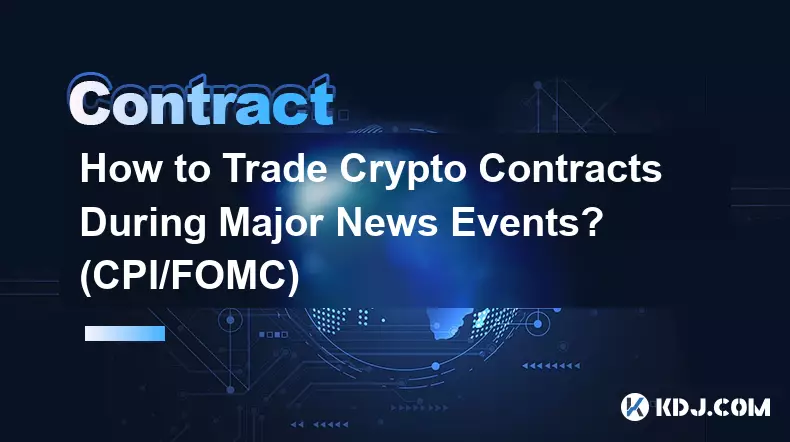
How to Trade Crypto Contracts During Major News Events? (CPI/FOMC)
Feb 05,2026 at 09:59am
Understanding Market Sensitivity to Macro Data Releases1. Cryptocurrency futures markets exhibit pronounced volatility during U.S. CPI and FOMC announ...

How to Manage Emotions and "Revenge Trading" in Futures?
Feb 05,2026 at 12:19am
Understanding Emotional Triggers in Futures Markets1. Market volatility directly impacts psychological states, often amplifying fear or euphoria based...

How to Analyze Market Sentiment Using the Fear and Greed Index?
Feb 05,2026 at 07:40am
Understanding the Fear and Greed Index1. The Fear and Greed Index is a composite metric designed to quantify prevailing emotional states among cryptoc...

How to Use Volume Profile to Find Key Futures Entry Levels?
Feb 04,2026 at 11:39pm
Understanding Volume Profile Structure1. Volume Profile displays the distribution of traded volume at specific price levels over a defined time period...

How to Trade Bitcoin Futures with 100x Leverage? (High-Risk Setup)
Feb 05,2026 at 11:00am
Understanding Bitcoin Futures Mechanics1. Bitcoin futures contracts represent agreements to buy or sell BTC at a predetermined price and date in the f...

How to Maximize Capital Efficiency Using Cross Margin Trading?
Feb 05,2026 at 12:40am
Cross Margin Trading Fundamentals1. Cross margin trading allows traders to use their entire account balance as collateral for open positions across mu...

How to Trade Crypto Contracts During Major News Events? (CPI/FOMC)
Feb 05,2026 at 09:59am
Understanding Market Sensitivity to Macro Data Releases1. Cryptocurrency futures markets exhibit pronounced volatility during U.S. CPI and FOMC announ...
See all articles










































































